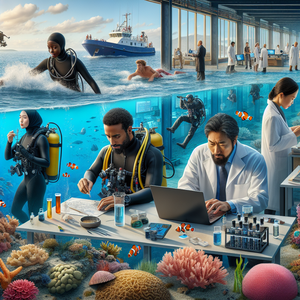
Exploring Marine Biology Careers: Discovering Opportunities, Earnings, and Paths for Ocean Lovers
Marine biology is a captivating field that invites exploration into the lives of marine organisms, their behaviors, and their intricate relationships with the environment. For those who feel drawn to the ocean's mysteries, pursuing a degree in marine biology can open up a wealth of fulfilling career opportunities. These roles not only enhance our understanding of marine ecosystems but also play a vital part in their preservation. With a projected 7% growth in marine and aquatic science jobs over the next decade, now is an excellent time to dive into this field.
Job Summaries:
Marine Biologist:
- As a marine biologist, you'll be at the forefront of research that explores ocean life and ecosystems.
- Your work will involve field studies, lab experiments, and data analysis.
- A Bachelor's degree in marine biology or a related discipline is essential, with advanced degrees often preferred.
- Salaries typically range from $50,000 to $80,000 annually, influenced by experience and location.
- This role is crucial for shaping conservation policies and protecting marine resources.
Marine Conservation Coordinator:
- Marine conservation coordinators are instrumental in devising and implementing strategies to safeguard marine ecosystems.
- Collaborating with government agencies and non-profits, they advocate for sustainable practices.
- A degree in marine biology or environmental science is essential, along with strong communication and project management skills.
- Salaries can range from $45,000 to $70,000 per year.
- This role is pivotal in combating threats to marine biodiversity, perfect for those passionate about ocean preservation.
Aquatic Scientist:
- Focusing on both freshwater and marine ecosystems
- Aquatic scientists assess ecosystem health and analyze water quality
- A Bachelor's degree in aquatic biology or environmental science is required
- Hands-on experience is often preferred
- Salaries typically range from $50,000 to $75,000
- Their research informs conservation strategies and regulatory measures
- Aquatic scientists are key contributors to ecosystem management
Marine Research Technician:
- Marine research technicians support marine biologists by conducting experiments and collecting vital data.
- This role often takes place in labs or on research vessels, where you'll handle equipment and prepare samples.
- A degree in marine biology or a related field is generally required, along with technical skills in laboratory procedures.
- Salaries typically range from $40,000 to $60,000 annually.
- This position is essential for advancing scientific research aimed at understanding marine ecosystems.
Marine Mammalogist:
- Specializing in marine mammals such as whales and dolphins
- Conduct field research
- Monitor populations
- Study behaviors
- A degree in marine biology or zoology is crucial
- Often complemented by wildlife research experience
- Salaries range from $50,000 to $85,000
- Work is vital for understanding the impacts of human activity on marine mammals
- Developing effective conservation measures
Marine Biotechnologist:
- Marine biotechnologists explore marine organisms for scientific research and product development.
- They frequently work in pharmaceuticals or environmental applications.
- A degree in marine biology or biotechnology is required.
- Lab skills and research methodologies are essential.
- Salaries can range from $60,000 to $90,000.
- This field holds significant promise for innovative solutions to global challenges.
- It is an attractive career choice.
Marine Policy Analyst:
- Marine policy analysts evaluate policies affecting marine environments and offer recommendations for sustainable management practices.
- Employed by government agencies or non-profits.
- Typically need a background in marine biology or environmental policy.
- Strong analytical and communication skills are essential.
- Salaries range from $55,000 to $85,000.
- Their work influences policies that protect ocean health and biodiversity.
Ecologist:
- Ecologists study the relationships between organisms and their environments, often with a focus on marine ecosystems.
- A degree in ecology, biology, or environmental science is required, along with fieldwork and data analysis experience.
- Salaries generally range from $50,000 to $80,000.
- Their research is crucial for understanding ecological systems and informing conservation efforts.
Commercial Diver:
- Commercial divers undertake underwater tasks linked to marine biology, such as habitat assessment and scientific research.
- Certification and diving experience are essential, along with knowledge of marine environments.
- Salaries can vary widely, averaging between $40,000 and $70,000, depending on the complexity of the work.
- This adventurous role contributes to various projects, including reef rehabilitation and underwater surveys.
Marine Educator:
- Marine educators work in aquariums, zoos, or educational institutions.
- Dedicated to teaching the public about marine life and conservation.
- A degree in marine biology or education is necessary.
- Strong communication skills are essential.
- Salaries typically range from $40,000 to $65,000.
- This role is vital for raising awareness and fostering appreciation for marine ecosystems through educational programming and outreach initiatives.
These career options showcase the vast opportunities available in marine biology, emphasizing the importance of education, skills, and a genuine passion for the ocean. For those eager to embark on a career in this sector, current job openings can serve as a gateway to making a meaningful impact on marine conservation and research. By exploring these diverse roles, aspiring marine biologists can identify a niche that aligns with their interests while making significant contributions to the preservation of our ocean ecosystems.
Explore More Jobs

